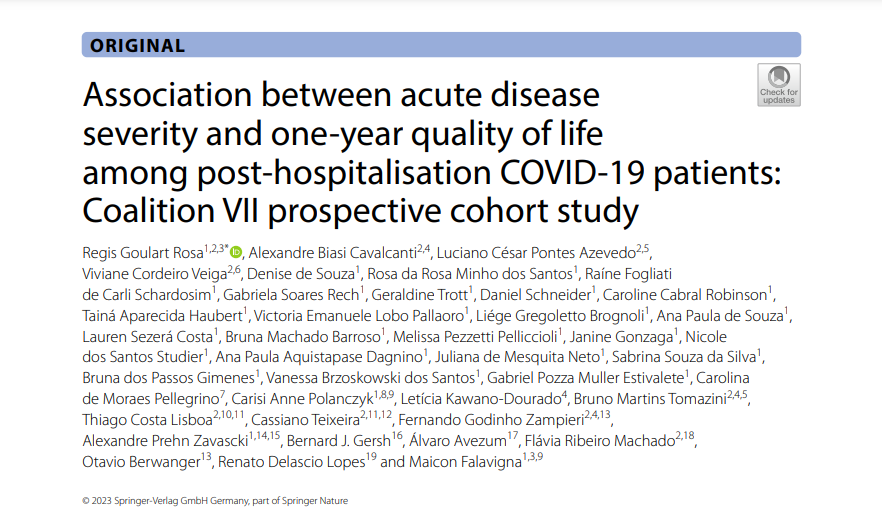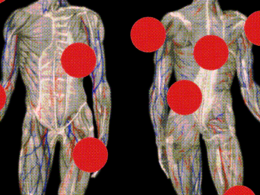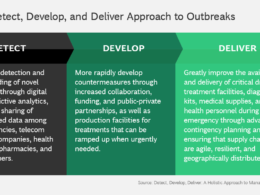health transformation –
strategy institute
Joaquim Cardoso MSc
Chief Researcher, Editor and Senior Advisor
January 3, 2023
Executive Summary
About the study:
- The purpose of this study was to assess the association between acute disease severity and quality of life in patients discharged after being hospitalized with COVID-19.
- The study was conducted as a prospective cohort study in Brazil, with adult patients followed for one year.
- The primary outcome measure was the utility score of the EuroQol five-dimension three-level (EQ-5D-3L) questionnaire, and secondary outcomes included all-cause mortality, major cardiovascular events, and new disabilities in instrumental activities of daily living.
- The results showed that, at one year, compared to patients with a severity score of 2 (no oxygen therapy needed), those with a severity score of 5 (mechanical ventilation needed) had lower EQ-5D-3L scores and worse outcomes for all-cause mortality, major cardiovascular events, and new disabilities.
- Severity scores 3 and 4 did not differ consistently from score 2.
- These findings suggest that COVID-19 patients who needed mechanical ventilation during hospitalization have lower quality of life at one year compared to those who did not need mechanical ventilation.
These findings suggest that COVID-19 patients who needed mechanical ventilation during hospitalization have lower quality of life at one year compared to those who did not need mechanical ventilation.
About the results:
- The results of this study suggest that COVID-19 patients who required mechanical ventilation during hospitalization had lower quality of life at one year compared to those who did not need mechanical ventilation.
- These patients also had worse outcomes for all-cause mortality, major cardiovascular events, and new disabilities.
- The study found that oxygen delivered by mask or nasal prongs or by non-invasive ventilation and use of high-flow nasal cannula oxygen therapy were not significantly associated with reduced quality of life.
- The study also found that COVID-19 severity was associated with a higher occurrence of major cardiovascular events and all-cause mortality, and with a higher impact on re-hospitalizations.
- The long-term impact of COVID-19 on physical and mental health and functional abilities should be considered in the management of patients with the disease.
The long-term impact of COVID-19 on physical and mental health and functional abilities should be considered in the management of patients with the disease.
ORIGINAL PUBLICATION

Association between acute disease severity and one-year quality of life among post-hospitalisation COVID-19 patients: Coalition VII prospective cohort study
Intensive Care Medicine
Regis Goulart Rosa1,2,3* , Alexandre Biasi Cavalcanti2,4, Luciano César Pontes Azevedo2,5, Viviane Cordeiro Veiga2,6, Denise de Souza1 , Rosa da Rosa Minho dos Santos1 , Raíne Fogliati de Carli Schardosim1 , Gabriela Soares Rech1 , Geraldine Trott1 , Daniel Schneider1 , Caroline Cabral Robinson1 , Tainá Aparecida Haubert1 , Victoria Emanuele Lobo Pallaoro1 , Liége Gregoletto Brognoli1 , Ana Paula de Souza1 , Lauren Sezerá Costa1 , Bruna Machado Barroso1 , Melissa Pezzetti Pelliccioli1 , Janine Gonzaga1 , Nicole dos Santos Studier1 , Ana Paula Aquistapase Dagnino1 , Juliana de Mesquita Neto1 , Sabrina Souza da Silva1 , Bruna dos Passos Gimenes1 , Vanessa Brzoskowski dos Santos1 , Gabriel Pozza Muller Estivalete1 , Carolina de Moraes Pellegrino7 , Carisi Anne Polanczyk1,8,9, Letícia Kawano‑Dourado4 , Bruno Martins Tomazini2,4,5, Thiago Costa Lisboa2,10,11, Cassiano Teixeira2,11,12, Fernando Godinho Zampieri2,4,13, Alexandre Prehn Zavascki1,14,15, Bernard J. Gersh16, Álvaro Avezum17, Flávia Ribeiro Machado2,18, Otavio Berwanger13, Renato Delascio Lopes19 and Maicon Falavigna1,3,9
ABSTRACT
Purpose
- To assess the association between acute disease severity and 1-year quality of life in patients discharged after hospitalisation due to coronavirus disease 2019 (COVID-19).
Methods
- We conducted a prospective cohort study nested in 5 randomised clinical trials between March 2020 and March 2022 at 84 sites in Brazil.
- Adult post-hospitalisation COVID-19 patients were followed for 1 year.
- The primary outcome was the utility score of EuroQol five-dimension three-level (EQ-5D-3L).
- Secondary outcomes included all-cause mortality, major cardiovascular events, and new disabilities in instrumental activities of daily living.
- Adjusted generalised estimating equations were used to assess the association between outcomes and acute disease severity according to the highest level on a modified ordinal scale during hospital stay (2: no oxygen therapy; 3: oxygen by mask or nasal prongs; 4: high-flow nasal cannula oxygen therapy or non-invasive ventilation; 5: mechanical ventilation).
Results
- 1508 COVID-19 survivors were enrolled. Primary outcome data were available for 1156 participants.
- At 1 year, compared with severity score 2, severity score 5 was associated with lower EQ-5D-3L utility scores (0.7 vs 0.84; adjusted difference, − 0.1 [95% CI − 0.15 to − 0.06]); and worse results for all-cause mortality (7.9% vs 1.2%; adjusted difference, 7.1% [95% CI 2.5%–11.8%]), major cardiovascular events (5.6% vs 2.3%; adjusted difference, 2.6% [95% CI 0.6%–4.6%]), and new disabilities (40.4% vs 23.5%; adjusted difference, 15.5% [95% CI 8.5%–22.5]). Severity scores 3 and 4 did not differ consistently from score 2.
Conclusions
- COVID-19 patients who needed mechanical ventilation during hospitalisation have lower 1-year quality of life than COVID-19 patients who did not need mechanical ventilation during hospitalisation.
Take-home message
- After 1 year of follow-up, patients with more severe COVID-19, defined as need for mechanical ventilation during hospitalisation, had
(1) significantly lower health-related quality of life and
(2) worse results for mortality, major cardiovascular events, re-hospitalisation, new disabilities in instrumental activities of daily living, anxiety and post-traumatic stress symptoms, and
(3) return to work or study — than COVID-19 patients who did not need mechanical ventilation during hospitalisation
After 1 year of follow-up, patients with more severe COVID-19, defined as need for mechanical ventilation during hospitalisation, had :
(1) significantly lower health-related quality of life and
(2) worse results for mortality, major cardiovascular events, re-hospitalisation, new disabilities in instrumental activities of daily living, anxiety and post-traumatic stress symptoms, and
(3) return to work or study — than COVID-19 patients who did not need mechanical ventilation during hospitalisation

Introduction
Coronavirus disease 2019 (COVID-19), caused by SARS-CoV-2 infection, has affected millions of people around the world. Brazil has been severely hit by the pandemic with the number of cases surpassing 35 million, with more than 680,000 deaths from COVID-19 by November 2022 [ 1]. Although a large amount of comprehensive data on acute symptoms and clinical management have been published, the long-term effects of COVID-19 remain unclear [ 2]. Recent studies have drawn attention to an increasing number of people experiencing prolonged symptoms following the acute phase of COVID-19 [ 3, 4, 5, 6, 7]. However, our knowledge of the long-term impact of acute COVID-19 severity on relevant outcomes, such as quality of life, cardiovascular events, new functional disabilities, and mental health symptoms, is rather limited. Notably, this evidence gap may constitute a barrier to understanding epidemiology, risk factors, and the natural history of post-COVID-19 disabilities, precluding the implementation of effective prevention and rehabilitation strategies. Accordingly, we conducted the Coalition VII prospective cohort study to investigate whether acute COVID-19 severity is associated with 1-year quality of life.
Methods & Other Sections
See the original publication (this is an excerpt version)
Results
See the original publication

Discussion
In this cohort study, we observed that, after 1 year of follow-up, patients with more severe COVID-19, defined as need for mechanical ventilation during hospitalisation, had lower health-related quality-of-life utility scores and worse results for mortality, major cardiovascular events, re-hospitalisation, new disabilities in instrumental activities of daily living, dyspnoea, anxiety and post-traumatic stress symptoms, and returning to work or study.
We found that post-hospitalisation COVID-19 patients who had received mechanical ventilation had clinically meaningful reductions in health-related quality of life utility scores at 3, 6, 9, and 12 months compared with those not requiring mechanical ventilation. Although these scores improved during the 1-year follow-up period, they were still below the mean value for the Brazilian population at 1-year. This is consistent with data from previous ARDS and long-term intensive care unit (ICU) follow-up studies. For example, Herridge et al. [ 24] demonstrated that, although survivors of ARDS improved their quality-of-life scores during the long-term follow-up, the mean score on the physical component of the 36-item Short-Form Health Survey at 5 years remained approximately 1 SD below the mean score for an age-matched and sex-matched control population. Similarly, Hofhuis et al. [ 25] showed that the health-related quality of life of medical-surgical ICU survivors remained impaired compared with their pre-admission values and with an age-matched reference population after 5 years, suggesting that the post-ICU COVID-19 and non-COVID-19 patients might have the same rehabilitation needs at the long-term. Notably, oxygen delivered by mask or nasal prongs or by non-invasive ventilation and use of high-flow nasal cannula oxygen therapy were not associated with a significant reduction in health-related quality-of-life utility scores in our study, suggesting that acute strategies aimed to prevent mechanical ventilation among patients with COVID-19 might be associated with improved long-term outcomes.
Concerning physical and mental disabilities, the findings of the present study showed a higher occurrence of new functional disabilities, dyspnoea and of anxiety and post-traumatic stress symptoms in patients requiring mechanical ventilation during hospitalisation. For example, mechanical ventilation patients had twice the prevalence of post-traumatic stress symptoms than the general population in Brazil [ 26]. We hypothesise that these results might have contributed to the worse quality of life among patients with more severe COVID-19, which is underlined by the association between physical and mental health outcomes and reduced 1-year quality of life in our study. Accordingly, new physical and mental disabilities have been associated with reduced quality of life among survivors of critical illness [ 27, 28].
The association between COVID-19 severity and higher occurrence of major cardiovascular events in this study is consistent with the population-based cohort study conducted by Xie et al., [ 29] who showed that, beyond the first 30 days after infection, individuals with COVID-19 are at increased risk of incident cardiovascular disease, and with the literature on long-term sepsis outcomes, which shows an excess hazard of late cardiovascular events among sepsis survivors which may persist for at least 5 years following hospital discharge [ 30].
The higher impact of COVID-19 severity on all-cause mortality and re-hospitalisations is also a reason for concern. These data reinforce that the attributable impact of COVID-19 on hospitalisations and mortality is even higher than that associated with acute illness.
Potential explanations were considered for the association between need for mechanical ventilation and poor long-term outcomes among survivors of COVID-19. First, need for mechanical ventilation can be interpreted as a proxy for disease severity, which may lead to persistent organ dysfunction after acute SARS-CoV-2 infection, thus contributing to long-term disabilities. Accordingly, studies have shown that patients with COVID-19 requiring mechanical ventilation are more likely to have elevated inflammatory markers, more extensive lung involvement, multiple organ dysfunction, and higher in-hospital mortality [ 31, 32, 33]. Second, the supportive care required by mechanically ventilated patients with COVID-19 and mechanical ventilation-related complications might have contributed to a higher occurrence of physical and mental disabilities among survivors of COVID-19. Studies of survivors of critical illness have found an association between mechanical ventilation-related factors (such as profound sedation, neuromuscular blocking agents, corticosteroids, immobilisation, and ventilator-associated pneumonia) and worse long-term outcomes (such as ICU-acquired weakness, post-traumatic stress, post-discharge mortality, and reduced quality of life) [ 34, 35, 36, 37]. Third, the unprecedented critical care capacity strain caused by the COVID-19 pandemic might have been associated with lower adherence to interventions aimed at preventing long-term disabilities among mechanically ventilated patients, such as minimising sedation and use of neuromuscular blocking agents, pain control, early mobilisation, and family presence [ 38].
Strengths of our study include its prospective design, large sample size, 1-year follow-up, and the assessment of patient-centred outcomes. However, this study has limitations. Although the study recruited from many hospitals, the sample was limited to one middle-income country. COVID-19 may have different effects on long-term outcomes across distinct contexts in terms of post-discharge access to rehabilitation services. We did not evaluate the pre-COVID-19 values of EQ-5D-3L, precluding the assessment of utility score variations in comparison to the pre-morbid period. We did not evaluate potentially relevant variables that could modify the association between acute COVID-19 severity and long-term outcomes, such as vaccination, infection with different SARS-CoV-2 variants, and specific treatments. The number of missing assessments for 1-year outcomes was relevant. Finally, we did not include a control group of patients without COVID-19, precluding the differentiation between specific COVID-19-mediated and critical illness-mediated effects on long-term outcomes.

Conclusions
COVID-19 patients who needed mechanical ventilation during hospitalisation have lower 1-year quality of life than COVID-19 patients who did not need mechanical ventilation during hospitalisation.
Funding
The Coalition VII was an investigator-initiated study. Pfizer provided partial financial support for this study (Grant number 68065723). Amongst trials that compose the present nested cohort, Coalition I and Coalition II have received partial support from EMS; Coalition III, from Laboratórios Farmacêuticos; Coalition IV, from Bayer; and Coalition VI, from Fleury Laboratory and Instituto Votorantim. The funders of the study had no role in study design, data collection, data analysis, data interpretation, writing of the manuscript, or decision to publish these results.
Cite this article
Rosa, R.G., Cavalcanti, A.B., Azevedo, L.C.P. et al. Association between acute disease severity and one-year quality of life among post-hospitalisation COVID-19 patients: Coalition VII prospective cohort study. Intensive Care Med (2023). Accepted:
Originally published at https://link.springer.com on January 3, 2023.
About the authors & affiliations
Regis Goulart Rosa1,2,3* , Alexandre Biasi Cavalcanti2,4, Luciano César Pontes Azevedo2,5, Viviane Cordeiro Veiga2,6, Denise de Souza1 , Rosa da Rosa Minho dos Santos1 , Raíne Fogliati de Carli Schardosim1 , Gabriela Soares Rech1 , Geraldine Trott1 , Daniel Schneider1 , Caroline Cabral Robinson1 , Tainá Aparecida Haubert1 , Victoria Emanuele Lobo Pallaoro1 , Liége Gregoletto Brognoli1 , Ana Paula de Souza1 , Lauren Sezerá Costa1 , Bruna Machado Barroso1 , Melissa Pezzetti Pelliccioli1 , Janine Gonzaga1 , Nicole dos Santos Studier1 , Ana Paula Aquistapase Dagnino1 , Juliana de Mesquita Neto1 , Sabrina Souza da Silva1 , Bruna dos Passos Gimenes1 , Vanessa Brzoskowski dos Santos1 , Gabriel Pozza Muller Estivalete1 , Carolina de Moraes Pellegrino7 , Carisi Anne Polanczyk1,8,9, Letícia Kawano‑Dourado4 , Bruno Martins Tomazini2,4,5, Thiago Costa Lisboa2,10,11, Cassiano Teixeira2,11,12, Fernando Godinho Zampieri2,4,13, Alexandre Prehn Zavascki1,14,15, Bernard J. Gersh16, Álvaro Avezum17, Flávia Ribeiro Machado2,18, Otavio Berwanger13, Renato Delascio Lopes19 and Maicon Falavigna1,3,9
1 Hospital Moinhos de Vento, Rua Ramiro Barcelos, 630, 10º Andar, Sala 1007, Porto Alegre, RS 90660‑020, Brazil.
2 Brazilian Research in Intensive Care Network (BRICNet), São Paulo, SP, Brazil.
3 Research Unit, INOVA Medical, Porto Alegre, RS, Brazil.
4 Hcor Research Institute, Hospital Do Coração, São Paulo, SP, Brazil.
5 Hospital Sírio-Libanês, São Paulo, SP, Brazil.
6 BP-A Benefcência Portuguesa de São Paulo, São Paulo, SP, Brazil.
7 Hospital M’Boi Mirim, São Paulo, SP, Brazil.
8 Cardiology Division, Hospital de Clínicas de Porto Alegre, Porto Alegre, RS, Brazil.
9 National Institute for Health Technology Assessment, IATS/CNPq, Porto Alegre, RS, Brazil.
10 PPG Ciências Pneumológicas UFRGS, Porto Alegre, RS, Brazil.
11 Intensive Care Department, Hospital de Clínicas de Porto Alegre, Porto Alegre, RS, Brazil.
12 UFCSPA Medical School, Porto Alegre, RS, Brazil.
13 Academic Research Organization, Hospital Israelita Albert Einstein, São Paulo, SP, Brazil.
14 Infectious Diseases and Infection Control Service, Hospital Moinhos de Vento, Porto Alegre, RS, Brazil.
15 Internal Medicine Department, Hospital de Clínicas de Porto Alegre, Porto Alegre, RS, Brazil.
16 Department of Cardiovascular Medicine, Mayo Clinic, Rochester, MN, USA.












